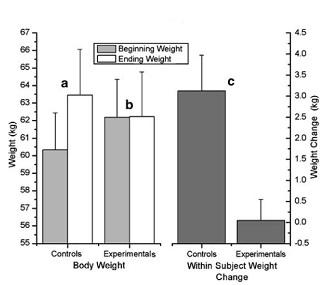Monitoring Body Weight : A Proven Method to Prevent Weight Gain
March 22 2010
The best way to lose weight is to prevent weight gain in the first place. Considering the environment, you are bound to put on some weight if you are not bothered about the things that go into your mouth.There are so many approaches to prevent weight gain, but most don’t have any scientific support.

One method that has been told to avoid is monitoring of your body weight. But recent studies shows otherwise.
What is wrong with daily weight monitoring?
It is widely believed that the large fluctuations in daily weight caused by changes in fluid balance can mask real changes in body mass and may discourage people from continuing those behaviors that might cause a loss in weight.
How is daily monitoring a useful method then?
Number of recent studies have shown that monitoring bodyweight to be an effective strategy to prevent weight gain
NWCR Study: One of the several behaviors identified with long term weight loss maintenance in the National Weight control Registry study was frequent monitoring of body weight .To be enrolled in the NWCR, individuals must have successfully lost at least 30 lbs and maintained that weight loss for at least 1 year.
The study showed that 36% of successful weight losers reported weighing themselves at least once a day, and 79% weighed themselves at least weekly.
Freshmen Study: The study showed daily monitoring be an effective technique to help female college freshmen resist gaining weight in an environment that is conducive to weight gain. Unlike the above group, this group represent people of normal weight trying to prevent weight gain.

The graph shows the difference in weight gain of the weight monitoring group and the control group . You can see almost a 6 pound difference between the groups and within the individual.
When interviewed at the end of the trial, the weight monitoring group said that when thy saw the weight increase, they decreased the amount of food they put on their plate, reduced the number of foods they put on the plate, skipped dessert, and even skipped a meal depending on how that change fit into their life style. Interestingly, the study used a simple technique called TMS. The Tissue Monitoring System (TMS) is an algorithm where the trend in daily body weight (over 7 days) rather than daily body weight is used to estimate body weight changes.
Other Studies: Apart from the studies above, number of other studies have looked at regular body weight monitoring. Overall the studies shows that self-weighing weekly or daily was associated with significantly greater weight loss & weight maintenance compared to infrequent self-weighing.
How does frequent weight monitoring work?
Self-regulation: Specifically, an individual who self-weighs often is believed to stay focused on and sensitive to changes in their weight. This creates more opportunities for self- encouragement) of even small weight loss (or weight maintenance) progress.
Also, the individual is able to quickly catch small weight gains before they escalate and make behavior changes accordingly ( diet or exercise) to prevent large weight gains.
The major limitations of the above approach stems from the fact that the studies used weight recalls ( recall biases) and the population was mostly middle aged american white females.
Practical Application
- Frequent weight monitoring helps in preventing weight regain and weight loss. Buy a scale if you don’t have one and weigh yourself daily or weekly
- We are not sure if there is a benefit to daily weighing or just weekly monitoring.
Reference 1
Reference 2
Related Articles
| Wed April 14, 2010
using scales and how much all depends on the person’s personality. for some people weighing themself every day and helps them stay on track while for other people weighing themselves every day makes them depressed and turns them right off - so its ‘’ horses for courses’’ so to speak
dean
http://www.getfit.com.au
Anoop | Wed April 14, 2010
Hi Dean,
Good point.
In fact, that could be a problem in certain subgroups and is one of the questions raised in the literature reveiws. It’s a full text (ref 1)
But almost all studies show better weight loss and weight maintenance.In fact,if the risks were greater than the benefits, we wouldn’t have seen the positive results in these studies.
Weighing the evidence: benefits of regular weight monitoring for weight control.
O’Neil PM, Brown JD.
Weight Management Center, Department of Psychiatry and Behavioral Sciences, Medical University of South Carolina, Charleston, SC 29425, USA. .(JavaScript must be enabled to view this email address)
We address the assertion that weighing obese patients in weight loss programs can be a source of distress and can lead to unfavorable outcomes. Examination of the relevant literature suggests that there is no evidence that weighing by weight loss participants is a cause of negative mood or of body dissatisfaction. Further, there is little evidence that negative mood states or body dissatisfaction lead to a poor outcome in weight loss programs. To the contrary, a number of studies consistently show that more frequent weighing is associated with better weight loss and maintenance. We offer suggestions for dealing with this issue in clinical practice.
| Thu June 24, 2010
Teaching or encouraging “weight” loss is dangerous but it keeps us personal trainers in a job so we can un-f**k people who’ve destroyed their metabolism through weight loss rather than fat loss.
Commenting is not available in this channel entry.
>



